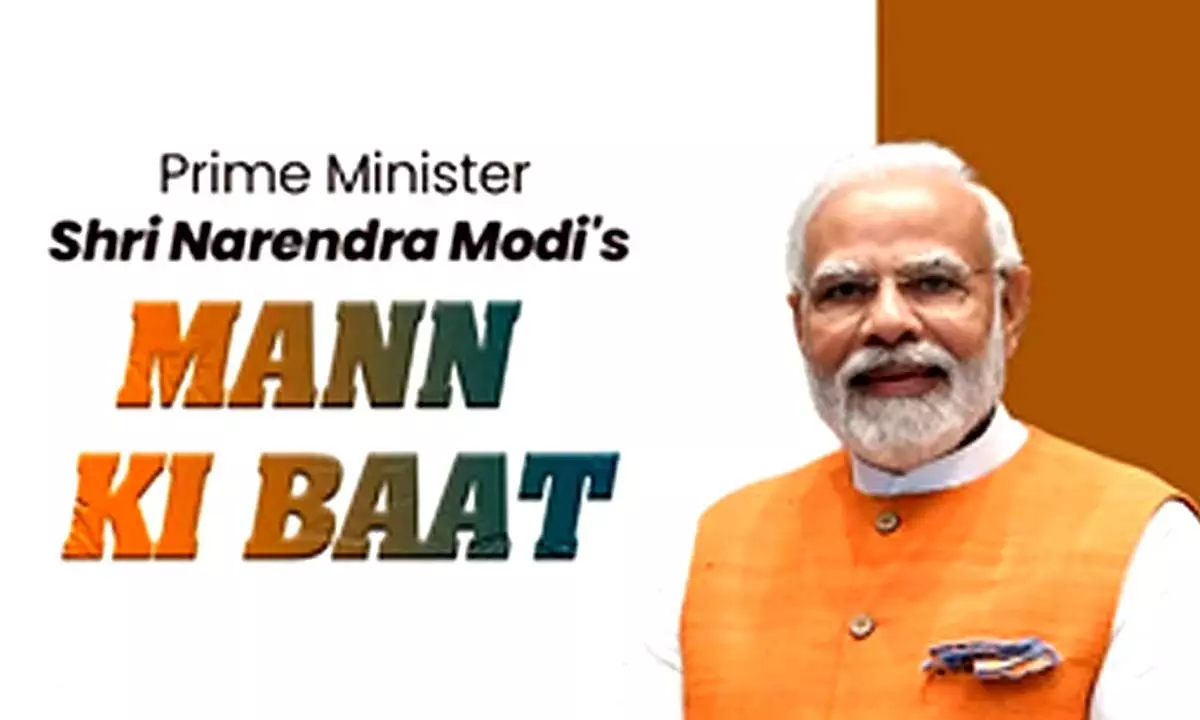10 things PM Modi spoke about in his Mann Ki Baat address
Share :

Prime Minister Narendra Modi resumed the broadcast of Mann Ki Baat with its 111th episode on Sunday. From Kerala's Karthumbi umbrellas to Andhra Pradesh's Araku coffee to Kashmir's snow peas
New Delhi: Prime Minister Narendra Modi resumed the broadcast of Mann Ki Baat with its 111th episode on Sunday. From Kerala's Karthumbi umbrellas to Andhra Pradesh's Araku coffee to Kashmir's snow peas, he spoke extensively about the contributions of various communities among other things to celebrate in India.
Mann Ki Baat resumed after a gap of three months in the light of the Model Code of Conduct enforced before the 18th Lok Sabha election. The Prime Minister congratulated 65 crore voters of India and all others associated with the poll process for keeping faith in democracy and executing the world’s largest election this year.
IANS condenses 10 things PM Modi specifically spoke about in his Mann Ki Baat address.
1. Beginning with commemorating June 30 as Hul Diwas, the Prime Minister recounted the sacrifice of the brave Murmu brothers, Sidhu and Kanhu, who in the Santhal Rebellion of 1855, rebelled against the foreign (British) rule. This had happened before the popularly believed earliest Revolt of 1857 against British rule. The PM dedicated a Santhali song in honour of these bravehearts.
2. Invoking the emotion of attachment to one’s mother, PM Modi initiated #PLANT4MOTHER: plant a tree dedicated mother as a gesture of acknowledging the "unpayable debt to her." He encouraged citizens to share their picture of planting a tree with their mother or her picture as a mark of respect to her and Mother Earth.
3. Further, in the view of monsoon, PM Modi spotlighted Karthumbi umbrellas made in Attappadi in Kerala. These umbrellas are made by tribal women and are sold online under the supervision of Vattalakki Cooperative Farming Society, headed and led by tribal women of Attappadi. They have also established a bamboo handicraft unit. With the aim of introducing their culture to the world, they will open a retail outlet and a café.
4. Speaking about the Paris Olympics that will take place next week, he wished the Indian contingent the best for the upcoming games. Refreshing memories of the Tokyo Olympics when athletes won medals and did India proud, he mentioned that these athletes have participated in about 900 international competitions. Paris Olympics will have some firsts from India. He cheered for them with #CHEER4BHARAT.
5. Subsequently, with an audio clip (in Hindi) from a Kuwaiti radio broadcast, he said that the government of Kuwait has started a half-hour programme in Hindi on its national radio every Sunday. This show will be about the vibrant Indian culture, films, and art that is popular among the Indian community there, as well as among Kuwaiti natives. He thanked their government for this initiative.
6. Speaking about the popularity and respect commanded by Indian culture across the globe, PM Modi mentioned that Turkmenistan celebrated in May the 300th birth anniversary of their national poet. On the occasion, their president unveiled statues of 24 famous poets of the world, including Rabindranath Tagore—an honour for both Gurudev and India
7. Likewise, Indian communities in two Caribbean countries celebrated their Indian heritage with fervour: Saint Vincent and the Grenadines on June 1 and Surinam on June 5. Along with Hindi, Bhojpuri is a popular language here.
8. PM Modi also spoke about the 10th International Day of Yoga observed across the world on June 21. He said: “Several records have been created across the globe. For the first time in Saudi Arabia, a Saudi woman instructed the main Yoga session. A photo of a Yoga session conducted on beaches of Red Sea at the bank of Nile River in Egypt has gone viral.”
The PM also mentioned the special Yoga sessions conducted in Myanmar, Sri Lanka, Bahrain, US and Bhutan. He also advised people to include Yoga in their daily routine to bring positive changes in life. PM Modi, this year, had celebrated Yoga Day in J&K’s Srinagar.
9. Talking about Kashmir, the PM said that the first consignment of snow peas was dispatched from Pulwama to London last month, putting the region’s exotic vegetable on the world map. An inspired Abdul Rashid Mir of Chakura village consolidated land and began growing snow peas. This pursuit has ushered prosperity for many people in J&K.
10. Stating that there is no dearth of unique products in India, and in a bid to promote ‘Vocal for Local’ initiative, PM Modi spotlighted Araku coffee produced in Andhra Pradesh’s Alluri Sitharama Raju district on a large scale. This coffee is known for its rich flavour and aroma.
He said: “Around 1.5 lakh tribal people are associated with Araku coffee cultivation. Girijan Cooperative has played a huge role in taking Araku Coffee to new heights. This has brought farmer brothers and sisters together. Because of this, farmers’ income has also increased and they are now leading a respectable life.”
PM Modi also recounted his experience of tasting this coffee with Andhra Pradesh Chief Minister N. Chandrababu Naidu in Visakhapatnam.
The Prime Minister concluded his address with a pitch for the promotion of Sanskrit language, PM Modi congratulated All India Radio family for connecting people with the ancient language. He said: “On June 30, the Sanskrit Bulletin of Akashwani is celebrating its 50th anniversary. Sanskrit has played a big role in the progress of ancient Indian knowledge and science.”
He also mentioned an initiative in Bengaluru where these days, local people gather in a park once a week and converse in Sanskrit.













